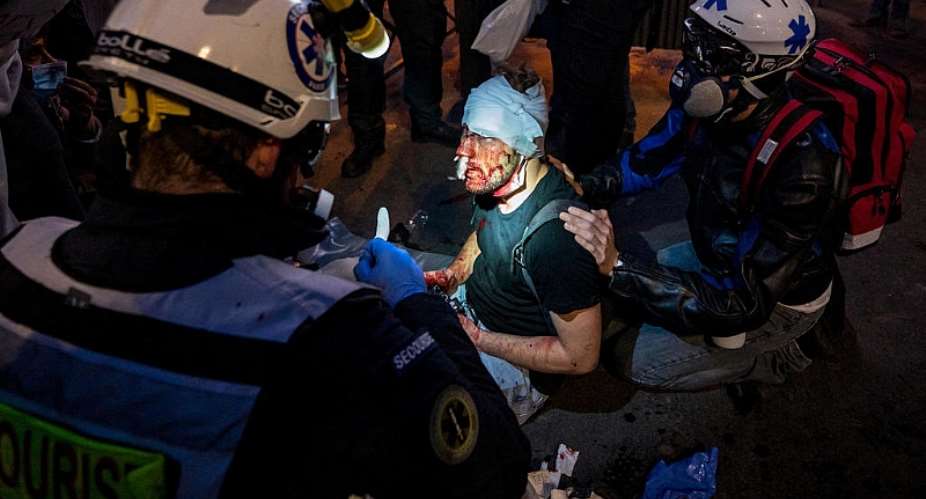Conditions at violent protests, harassment during investigative reports and concentrated media ownership are all detrimental to press freedom in France, watchdog Reporters Without Borders said Tuesday as it published its annual World Press Freedom Index.
Reporters Without Borders, abbreviated RSF in French, maintained France's ranking of 34 out of 180 countries surveyed due to a range of factors affecting how journalists work.
“Covering protests has become problematic for reporters, who have often been subjected to police violence,” said the group's page on France, which showed a score slightly down from that of the 2020 index.
“Several were injured by Flashball rounds, teargas grenades or baton blows. Others were arbitrarily detained or had their equipment seized,” the group said, noting some incidents happened during protests against a proposal that critics feared would affect the online publication of images of police officers.
RSF also criticised the IGPN police affairs bureau for summoning investigative journalists, which the group said could “threaten the confidentiality of a reporter's sources, which are not sufficiently protected by French legislation”.
The group also highlighted issues with editorial independence in a media landscape dominated by concentrated ownership and integration into large industry groups with economic interests beyond media.
“This encourages conflicts of interest that feed mistrust of the media,” the report said. “The overall climate is still one of hostility towards journalists, especially on social media, even if verbal attacks by politicians seem to have let up somewhat.”
Consistent position, varying reasons
RSF builds the index based on questionnaires sent to experts and data on abuse and acts of violence against journalists and calculates a score based on pluralism, independence, self-censorship and other factors.
For the second year in a row, France was in 34th place, just behind Britain in 33rd and ahead of Italy and the United States, in 41st and 44th positions, respectively.
France's ranking has not hit a low point. Beginning at 37 with the first ranking in 2013, its position declined to 45 on the 2016 index, due to the previous year's killing of journalists at Charlie Hebdo.
Topping the index for press freedom were Norway, Finland, Sweden, Denmark and Costa Rica. Eritrea was at the bottom of the list, after North Korea, Turkmenistan, China and Djibouti.
In Europe, the group also noted attacks against journalists and arbitrary arrests in Germany, Italy, Poland, Greece, Serbia or Bulgaria, all of which either maintained or fell in their positions on the index.
Coronavirus pandemic led to repression
Research for the 2021 World Press Freedom Index found journalism was at least partly blocked in nearly three-quarters of the 180 countries surveyed, either “totally blocked or seriously impeded” in 73 countries or “constrained” in 59 others.
The group said that global rankings had remained consistent since last year but warned some governments had used the coronavirus pandemic to harm press freedom.
“Journalism is the best vaccine against disinformation,” RSF secretary general Christophe Deloire said in a statement. “Unfortunately, its production and distribution are too often blocked by political, economic, technological and, sometimes, even cultural factors.”
- African countries exploiting Covid crisis to clamp down on free speech: HRW
- 2020 was a hazardous year for African journalists marked by killings, harassment, arrests, Covid
The Middle East and North Africa region was the most repressive for journalists, the report found, highlighting worsening situations in Iran, Saudi Arabia, Egypt and Syria over the past year.
RSF said the global level of media freedom was mostly stable for the past year but noted figures had deteriorated by 12 percent since the annual ranking was launched in 2013.
Online misinformation and political polarisation contributed to falling trust in journalists, the group said, noting a recent survey by the Edelman Trust found 59 percent of respondents in 28 countries believed journalists deliberately misled the public.
(with newswires)





 Election 2024: Ghanaians will vote to erase Akufo-Addo’s horrifying legacy – Nii...
Election 2024: Ghanaians will vote to erase Akufo-Addo’s horrifying legacy – Nii...
 BP killed ex-Weija-Gbawe MCE – Tina Mensah reveals
BP killed ex-Weija-Gbawe MCE – Tina Mensah reveals
 Limited voter registration exercise: NDC slams EC over mass technical challenges
Limited voter registration exercise: NDC slams EC over mass technical challenges
 UK, America will one day come to Ghana to borrow Akufo-Addo to be their presiden...
UK, America will one day come to Ghana to borrow Akufo-Addo to be their presiden...
 EOCO returns fire at OSP over Cecilia Abena Dapaah’s money laundering case
EOCO returns fire at OSP over Cecilia Abena Dapaah’s money laundering case
 Anti-corruption endeavours must be rooted in systems, investigations and prosecu...
Anti-corruption endeavours must be rooted in systems, investigations and prosecu...
 We’ve not introduced 1% cybersecurity levy on banking transactions – BoG
We’ve not introduced 1% cybersecurity levy on banking transactions – BoG
 EU hits out at sidelining of Chad election observers
EU hits out at sidelining of Chad election observers
 ‘Be calm; we’re having engagements on new fee implementation’ — KNUST SRC assure...
‘Be calm; we’re having engagements on new fee implementation’ — KNUST SRC assure...
 Bawumia is compassionate, unique politician without corruption tag — Miracles Ab...
Bawumia is compassionate, unique politician without corruption tag — Miracles Ab...
